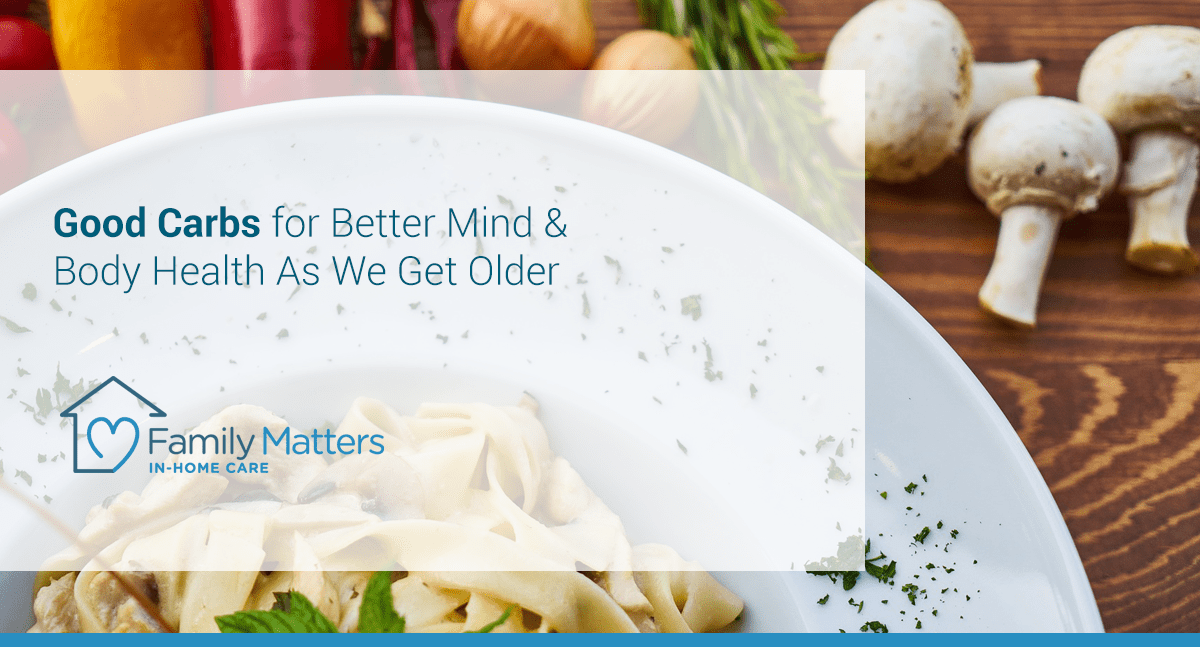
Good Carbs for Better Mind & Body Health As We Get Older
Many diets make carbohydrates the bad guy, but don’t be fooled, carbohydrates are good for you, and necessary for a healthy mind and body. As we age we need to eat a diet rich in vitamins and minerals and high in nutrients; carbohydrates are an important part of that equation.
What are carbohydrates?
To understand carbohydrates (carbs) is to understand the two types of carbs, the speed with which they work, and the foods in which they are found. Here’s an overview of the important information you need.
There are two types of carbohydrates (carbs) called simple and complex. Both simple and complex carbs are converted into a type of sugar, called glucose, that acts as fuel for the body, especially the brain. Although it is important, glucose must be carefully regulated to avoid weight gain. For diabetics, glucose must be regulated to control blood sugar levels.
Regulating glucose is a matter of understanding how the body processes specific carbs to release it into the body. Simple carbs are processed faster than complex carbs.
- Simple carbs are found in dairy products like fruit and fruit juice, honey, and table sugar.
- Complex carbs, (also called starches) are found in white bread, pasta, rice, and vegetables like sweet potatoes, corn and winter squash.
Here is where it can get a bit confusing. Both white bread and whole grain bread contain carbs. However, white bread is a refined carb with all the fiber removed. It releases glucose into the bloodstream quickly and is not filling. However, whole grain bread has fiber that slows down the speed with which glucose enters the bloodstream. When you eat carbs that also have fiber, like whole grain bread and brown rice, you avoid an energy crash and feel fuller longer.
Both simple and complex carbs can be found in a variety of foods. Make sure you eat more healthy, complex carbs to maintain a healthy weight and healthy glucose levels.
Simple carbs1 can be found in:
- Soda
- Bakery foods
- Homemade baked sweets and desserts
- Packaged cookies
- Fruit juices
- Breakfast cereals
Complex carbs can be found in:
- Whole grain bread and rice
- HIgh fiber fruits such as apples and berries
- High fiber vegetables such as broccoli and carrots
- Any type of bean
When choosing whole grain bread, make sure it says 100% whole grain on the label and that the first ingredient listed in whole grain. Otherwise you will be purchasing bread that has whole grain in it, but not truly a whole grain product.
Why do diets promote low carb eating plans?
Eating fewer carbs forces your body to get energy by burning fat and protein. However, those are not efficient sources of energy. Harvard Medical School2 describes the process in the following manner:
- Fat does not completely digest when it is used as an energy source. By-products called ketones are formed. Ketones are mildly acidic. They can build up in the blood and make it more acidic. Over time this may be harmful to the body.
- Protein’s main job is to be a building block, not an energy source. Using protein for energy can compromise the building of muscles and other cells.
Best way to balance carbs
The best way to balance carbs, and therefore glucose, is to eat a well-balanced diet that includes more complex carbs than simple carbs. When you eat foods that contain simple carbs, like corn, squash and white rice, limit them to one-quarter of your plate. Fill the rest of your plate with protein and high fiber fruits and vegetables like leafy greens, quinoa, whole-wheat pasta, bananas and other healthy foods. Your body will get the energy it needs, while regulating glucose, and feeling full.
When you think about eating carbs, remember this – eat the good ones. Carbs are not the bad guys as many commercial diets would have you believe. Whole grains contain B vitamins, vitamin E, zinc and magnesium. Vegetables contain phytonutrients that can help to prevent disease and illness. It’s a balancing act, but one that is great to important to master for the benefit of your healthy body and brain.
If you or your family member is considering in-home care as part of a plan to age in place, contact Family Matters In-Home Care today for a free consultation. Our team is dedicated to supporting your family and helping older adults enjoy life in the comfort of their own home for as long as possible.
Some of the services offered by Family Matter In-Home Care include: Alzheimer’s & Dementia Care, Bed & Wheelchair Transfer Assistance, Companionship, Housekeeping & Meal Preparation, Personal Care, Recovery Care, and Transportation.
Serving the San Francisco Bay Area and Greater San Diego, Family Matter In-Home Care has offices throughout California including: Campbell, CA, Roseville, CA, San Marcos, CA, and San Mateo, CA.
Sources:
